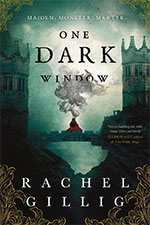 One Dark Window (The Shepherd King #1), by Rachel Gillig
One Dark Window (The Shepherd King #1), by Rachel Gillig
Elspeth needs a monster. The monster might be her.
Elspeth Spindle needs more than luck to stay safe in the eerie, mist-locked kingdom of Blunder—she needs a monster. She calls him the Nightmare, an ancient, mercurial spirit trapped in her head. He protects her. He keeps her secrets.
But nothing comes for free, especially magic.
When Elspeth meets a mysterious highwayman on the forest road, her life takes a drastic turn. Thrust into a world of shadow and deception, she joins a dangerous quest to cure Blunder from the dark magic infecting it. And the highwayman? He just so happens to be the King’s nephew, Captain of the most dangerous men in Blunder…and guilty of high treason.
Together they must gather twelve Providence Cards—the keys to the cure. But as the stakes heighten and their undeniable attraction intensifies, Elspeth is forced to face her darkest secret yet: the Nightmare is slowly taking over her mind. And she might not be able to stop him.
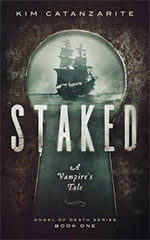 Staked: A Vampire’s Tale, by Kim Catanzarite
Staked: A Vampire’s Tale, by Kim Catanzarite
Can an angel also be a monster?
Gregorie Babin has existed in a gently lulling darkness for so long he’s not even sure he’s human anymore. Surrounded by four walls, without light or space in which to move, he has become what he envisions as a mollusk inside a shell. Is he alive or dead, or perhaps in some kind of purgatory or Hell? The answer lies in a past he no longer remembers. It is only when random forces break him out of this perpetual darkness that he can begin to know the devastating truth—and what it means for his future.
 A Game of Lies (DC Morgan #2), by Clare Mackintosh
A Game of Lies (DC Morgan #2), by Clare Mackintosh
Stranded in the Welsh mountains, seven reality show contestants have no idea what they’ve signed up for.
Each of these strangers has a secret. If another player can guess the truth, they won’t just be eliminated – they’ll be exposed live on air. The stakes are higher than they’d ever imagined, and they’re trapped.
The disappearance of a contestant wasn’t supposed to be part of the drama. Detective Ffion Morgan has to put aside what she’s watched on screen, and find out who these people really are – knowing she can’t trust any of them.
And when a murderer strikes, Ffion knows every one of her suspects has an alibi . . . and a secret worth killing for.
 Baby X, by Kira Peikoff
Baby X, by Kira Peikoff
In the near-future United States, where advanced technology can create egg or sperm from any person’s cells, celebrities face the alarming potential of meeting biological children they never conceived. Famous singer Trace Thorne is tired of being targeted by the Vault, a black market site devoted to stealing DNA. Sick of paying ransom money for his own cell matter, he hires bio-security guard Ember Ryan to ensure his biological safety.
Ember will do anything she can to protect her clients. She knows all the Vault’s tricks–discarded tissues, used straws, lipstick tubes–and has prevented countless DNA thefts. Working for Thorne, her focus becomes split when she begins to fall for him, but she knows she hasn’t let anything slip–love or not, his DNA is safe. But then she and Thorne are confronted by a pregnant woman, Quinn, who claims that Thorne is the father of her baby, and all bets are off.
Brilliantly plotted and terrifyingly prescient, Baby X is an unpredictable and relentless speculative thriller perfect for fans of Blake Crouch.
 Ella, by Diane Richards
Ella, by Diane Richards
In the vein of The Paris Wife and The Personal Librarian comes this debut novel, a magnificent work of “biographical fiction” that reimagines the turbulent and triumphant early years of Ella Fitzgerald, arguably the greatest singer of the twentieth century.
When fifteen-year-old Ella Fitzgerald’s mother dies at the height of the Depression in 1932, the teenager goes to work for the mob to support herself and her family. When the law finally catches up, the “ungovernable” adolescent is incarcerated in the New York Training School for Girls in upstate New York—a wicked prison infamous for its harsh treatment of inmates, especially Black ones.
Determined to be free, Ella escapes and makes her way back to Harlem, where she is forced to dance for pennies on the street. Looking for a break into show business, Ella draws straws to appear at the Apollo Theater’s Amateur Night on November 21, 1934. Rather than perform a dance routine directly after “The World Famous Edwards Sisters” number, the homeless Ella, wearing men’s galoshes a size too big, risks everything when she decides to sing Judy instead.
Four years later, at barely twenty-one, Ella Fitzgerald has become the bestselling female vocalist in America.
Diane Richards’ Ella Fitzgerald is inspiring and intriguing—an emotionally rich, psychologically complex character, a flawed mother and wife who struggles with deep emotional scars and trauma and battles racism, sexism, and colorism as she learns to find her voice on the stage.
Compelling and rich in historical detail, Ella is a remarkable debut novel about an extraordinary woman.
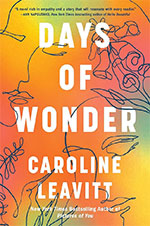 Days of Wonder, by Caroline Leavitt
Days of Wonder, by Caroline Leavitt
As a teenager, for a moment, Ella Fitchburg found love—yearning, breathless love—that consumed both her and her boyfriend, Jude, as they wandered the streets of New York City together. But her life was unexpectedly upended when she was accused of trying to murder Jude’s father, an imperious superior court judge, and sentenced to twenty-five years in prison. When she learns she’s pregnant shortly after sentencing, she reluctantly decides to give up the child.
Ella is released after serving only six years. While she is desperate to turn the page on a new life, she can’t seem to let go of her past. With only an address as a possible lead, she moves to Ann Arbor, Michigan, determined to get her daughter back.
Forced to hide her identity and complicated past and live in a constant state of deception, she finds that what she’s been searching for all along is a way to uncover and live with the truth. Yet a central mystery neither Jude nor Ella can remember the events leading up to the attempted murder—that fateful night which led to Ella’s conviction.
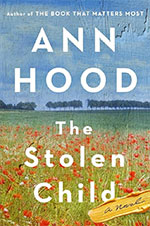 The Stolen Child, by Ann Hood
The Stolen Child, by Ann Hood
For decades, Nick Burns has been haunted by a decision he made as a young soldier in World War I, when a French artist he’d befriended thrust both her paintings and her baby into his hands―and disappeared. In 1974, with only months left to live, Nick enlists Jenny, a college dropout desperate for adventure, to help him unravel the mystery.
The journey leads them from Paris galleries and provincial towns to a surprising the Museum of Tears, the life’s work of a lonely Italian craftsman. Determined to find the baby and the artist, hopeless romantic Jenny and curmudgeonly Nick must reckon with regret, betrayal, and the lives they’ve left behind.
 Long After We Are Gone, Terah Shelton Harris
Long After We Are Gone, Terah Shelton Harris
“Don’t let the white man take the house.”
These are the last words King Solomon says to his son before he dies. Now all four Solomon siblings must return to North Carolina to save the Kingdom, their ancestral home and 200 acres of land, from a development company, who has their sights set on turning the valuable waterfront property into a luxury resort.
While fighting to save the Kingdom, the siblings must also save themselves from the secrets they’ve been holding onto. Junior, the oldest son and married to his wife for 11 years, is secretly in love with another man. Second son, Mance, can’t control his temper, which has landed him in prison more than once. CeCe, the oldest daughter and a lawyer in New York City, has embezzled thousands of dollars from her firm’s clients. Youngest daughter, Tokey, wonders why she doesn’t seem to fit into this family, which has left an aching hole in her heart that she tries to fill in harmful ways. As the Solomons come together to fight for the Kingdom, each of their façades begins to crumble and collide in unexpected ways.
Told in alternating viewpoints, Long After We Are Gone is a searing portrait on the power of family and letting go of things that no longer serve you, exploring the burden of familial expectations, the detriment of miscommunication, and the lessons and legacies we pass on to our children.
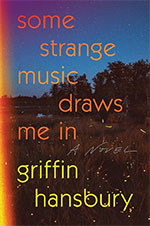 Some Strange Music Draws Me In, by Griffin Hansbury
Some Strange Music Draws Me In, by Griffin Hansbury
It’s the summer of 1984 in Swaffham, Massachusetts, when Mel (short for Melanie) encounters Sylvia, a tough-as-nails trans woman whose shameless swagger catalyzes Mel’s dawning trans self-awareness. But it also sparks the fury of townie Swaffham and throws Mel into conflict with her mother and best friend.
Decades later, Max (formerly Mel) is on probation from his teaching job for (ironically) defying speech codes around trans identity. Back in Swaffham, he must face his own role in the disasters of the past. With the charged teenage emotion of Claire Messud’s The Burning Girl and the propulsive social interrogation of Rebecca Makkai’s I Have Some Questions for You, Hansbury reckons with gender and class as he delivers a timely and captivating narrative of self-realization amid the everyday violence of small-town intolerance. As the story builds to its explosive conclusion, Some Strange Music Draws Me In illuminates the unexpected ways that queerness can provide a ticket to liberation.
 The Evolution of Annabel Craig, by Lisa Grunwald
The Evolution of Annabel Craig, by Lisa Grunwald
Annabel Hayes—born, baptized, and orphaned in the sleepy conservative town of Dayton, Tennessee—is thrilled to find herself falling quickly and deeply in love with George Craig, a sophisticated attorney newly arrived from Knoxville. But before the end of their first year of marriage, their lives are beset by losses. The strain on their relationship is only intensified when John T. Scopes is arrested for teaching Charles Darwin’s theory of evolution at the local high school.
Foreshadowing today’s culture wars, the trial against Scopes is a spectacle unlike any the country has seen. William Jennings Bryan—a revered Southern politician—joins the prosecution, pitting himself and his faith against the renowned defense attorney Clarence Darrow. Journalists descend in a frenzy, thrusting the town and its citizens into the national spotlight. And when George joins the team defending Scopes, Annabel begins to question both her beliefs and her vows.
As the ongoing trial divides neighbor against neighbor, it also divides the Craigs in unexpected ways. But in the midst of these conflicts—one waged in an open courtroom, the other behind closed doors—Annabel will discover that the path to her own evolution begins with the courage to think for herself.
 Becoming Madam Secretary, by Stephanie Dray
Becoming Madam Secretary, by Stephanie Dray
Raised on tales of her revolutionary ancestors, Frances Perkins arrives in New York City at the turn of the century, armed with her trusty parasol and an unyielding determination to make a difference.
When she’s not working with children in the crowded tenements in Hell’s Kitchen, Frances throws herself into the social scene in Greenwich Village, befriending an eclectic group of politicians, artists, and activists, including the millionaire socialite Mary Harriman Rumsey, the flirtatious budding author Sinclair Lewis, and the brilliant but troubled reformer Paul Wilson, with whom she falls deeply in love.
But when Frances meets a young lawyer named Franklin Delano Roosevelt at a tea dance, sparks fly in all the wrong directions. She thinks he’s a rich, arrogant dilettante who gets by on a handsome face and a famous name. He thinks she’s a priggish bluestocking and insufferable do-gooder. Neither knows it yet, but over the next twenty years, they will form a historic partnership that will carry them both to the White House.
Frances is destined to rise in a political world dominated by men, facing down the Great Depression as FDR’s most trusted lieutenant—even as she struggles to balance the demands of a public career with marriage and motherhood. And when vicious political attacks mount and personal tragedies threaten to derail her ambitions, she must decide what she’s willing to do—and what she’s willing to sacrifice—to save a nation.
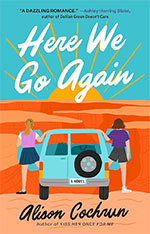 Here We Go Again, by Alison Cochrun
Here We Go Again, by Alison Cochrun
A long time ago, Logan Maletis and Rosemary Hale used to be friends. They spent their childhood summers running through the woods, rebelling against their conservative small town, and dreaming of escaping. But then an incident the summer before high school turned them into bitter rivals. After graduation, they went ten years without speaking.
Now in their thirties, Logan and Rosemary find they aren’t quite living the lives of adventure they imagined for themselves. Still in their small town and working as teachers at their alma mater, they’re both stuck in old patterns. Uptight Rosemary chooses security and stability over all else, working constantly, and her most stable relationship is with her label maker. Chaotic and impulsive Logan has a long list of misguided ex-lovers and an apathetic shrug she uses to protect herself from anything real. And as hard as they try to avoid each other—and their complicated past—they keep crashing into each other. Including with their cars.
But when their beloved former English teacher and lifelong mentor tells them he has only a few months to live, they’re forced together once and for all to fulfill his last a cross-country road trip. Stuffed into the gayest van west of the Mississippi, the three embark on a life-changing summer trip—from Washington state to the Grand Canyon, from the Gulf Coast to coastal Maine—that will chart a new future and perhaps lead them back to one another.
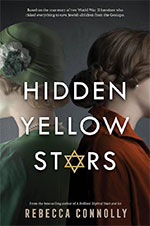 Hidden Yellow Stars, by Rebecca Connolly
Hidden Yellow Stars, by Rebecca Connolly
Based on the true story of two World War II heroines who risked everything to save Jewish children from the Gestapo by hiding them throughout Belgium.
Belgium, 1942
Young schoolteacher Andrée Geulen secretly defies the Nazis in Belgium, who are forcing Jews to wear a yellow Star of David. Andrée is not Jewish, but she feels a maternal connection to her students, who are living in constant fear, and decides to take action. No child should have to suffer under such persecution. But what can one woman do against an entire army?
Ida Sterno is a Jewish woman who works with the Committee for the Defense of Jews in Belgium, a clandestine resistance group tasked with hiding children from the Gestapo. She wants to recruit Andrée because her Aryan appearance can provide crucial security measures for their efforts. Andrée agrees to join and begins work immediately by adopting a code name: Claude Fournier.
Together, Andrée and Ida, and their undercover operatives, work around the clock to move Jewish children from their families and smuggle them to safety through the secret channels established by the resistance. As each child is hidden, Andrée commits to memory their true name and history. Someday, she vows, she will help reunite as many of these families as she can.
But with the Gestapo closing in and the traitorous Fat Jacques who has turned from ally to enemy and is threatening to identify and expose any Jew he meets, Andrée and Ida must work even harder against increasingly impossible odds to save as many children as possible and keep them safely hidden—even if it might cost them their own lives.
